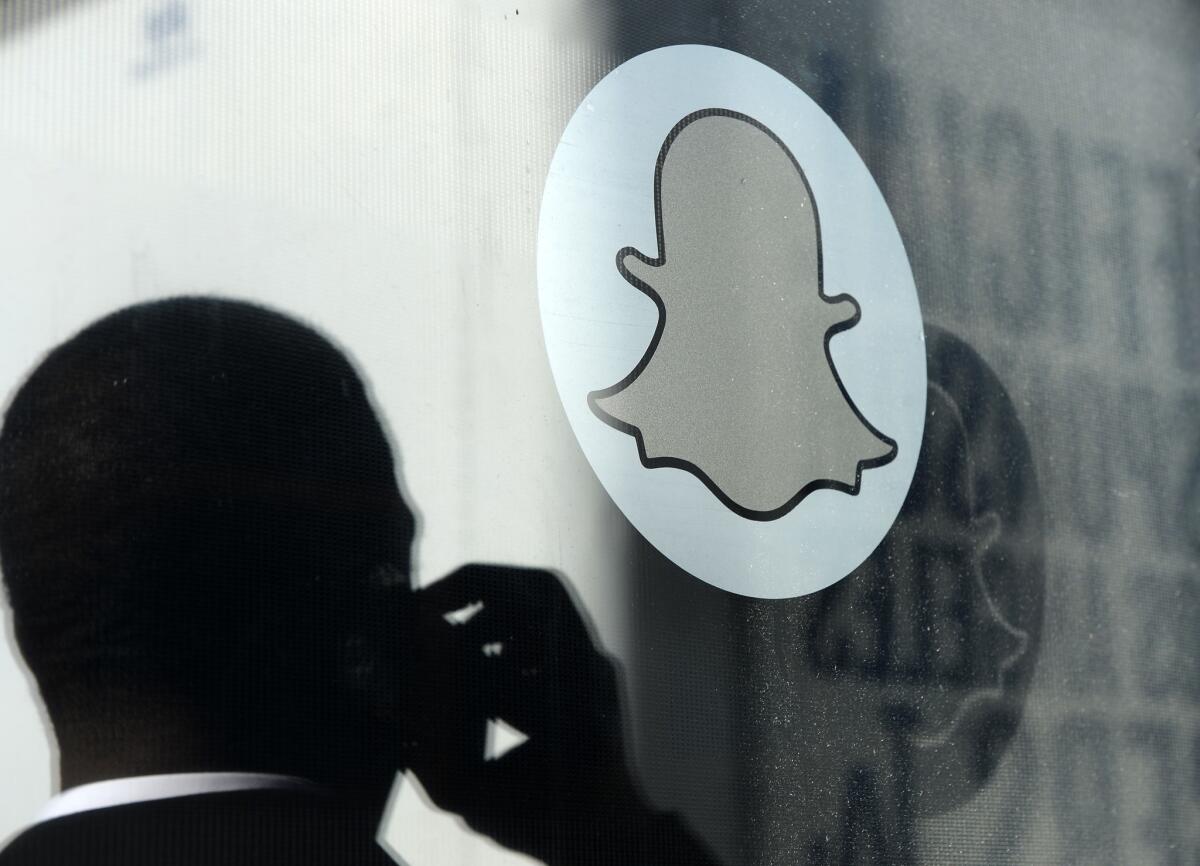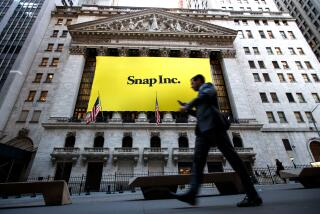You could be paid to post Snapchat photos and videos, patent filing suggests

- Share via
Snapchat Inc. could begin paying users to post photos and videos, according to patent filings that reveal another way for the company to push the bounds of social media advertising.
Through its popular Live Stories feature, the Venice firm produces highlight reels of events across the world made up of user-submitted images related to specific cities, sports games, concerts or other occasions.
Organizing the highlights is a laborious process that forces workers to sift through tens of thousands of posts, though the payoff easily can soar to 20 million viewers on a single story.
See more of our top stories on Facebook »
But patent applications from December 2014 that were made public Thursday, per regulation, suggest Snapchat at least has an idea in mind to offer more stories without many additional curators. Surfacing greater amounts of well-organized material is crucial to get users to spend more time with Snapchat, a 5-year-old start-up aiming to develop a multibillion-dollar business by selling ads between the content.
The filings reveal that Snapchat automatically could analyze annotations on an image, including text and digital stickers, to prompt users to place their images in a gallery that others could access on the app. In other words, people who type some variation of “Clippers!!!” on top of their photo during a Clippers basketball game would have access to a library of images related to the game.
The company could also use computer vision technology to identify objects in an image — say, a Coke bottle — to encourage a user to share the shot in a Coca-Cola-sponsored story. Contributors could walk away with cash through a flat fee or some other deal based on views or sales generated by the story.
There have been rumblings about a similar system coming to Snapchat in the near future, said Nick Cicero, chief executive of Snapchat-focused ad agency Delmondo, which has worked with AT&T, Cinnabon and Lowe’s.
Advertisers are eager to take advantage of user-generated images mentioning their brands, as software from Zefr, YouTube and other companies already allow for on other social media apps. A company might spend hundreds of thousands of dollars to sponsor a digital sticker on Snapchat, but then have no way to promote posts that display the sticker.
“Brands want to break things out into more of a public view, but they are stuck in a hole,” Cicero said. Should the new feature launch, “more and more brands are going to realize they can do large-scale events, take the power of Live Stories and center it on a brand.”
The idea in the patent filing also would give advertisers an official way to compensate people for creative posts, compared with the usual strategy of paying top users to turn their personal accounts into an ad.
Millions of Snapchat users regularly share images containing sponsored stickers and animations. It’s difficult to predict if a financial incentive would affect the way people use the app, or lead to more brand-laden images.
But the filing suggests Snapchat or sponsors could manually curate the galleries or leave that to the app’s technology, with object recognition and text analysis as potential ways to filter inappropriate submissions.
Other types of automatically generated galleries mentioned in the patent application include stories based on a time stamp, temperature or movement (like running, identifiable through a smartphone’s accelerometer). People could definite their own categories too.
Previously, Snapchat has used only the location of users to determine who has the opportunity to participate in Live Stories.
With the features described in the patent, Snapchat would accomplish through data from smartphone sensors and algorithms what Twitter and Instagram provide for largely through hashtags, or words describing a topic that are preceded by the character “#.” They all come down to understanding what conversations on the services are about, said Eric Dahan, chief executive of social media celebrity marketing firm Instabrand.
“Snapchat has been aggressively opening up paid ads,” Dahan said. “This is a way of collecting data to sell those ads and target those ads to the right groups. Now all of a sudden, they have something more compelling for advertisers.”
It’s unclear whether Snapchat has introduced the features. The company declined to comment.
But the paperwork discusses one tool that appears to have debuted at least partially in December. The document outlines the use of audio-recognition software to string together short videos, each featuring people singing different lines of a song, to make a music video. Snapchat created one such mash-up for “The Twelve Days of Christmas.”
Users who get into an audio timeline could get paid too, the patent filing states. A patent covering various story-related features is set to be granted next month, according to federal records.
ALSO
Twitter and Vine loosen limits to hold on to users
Snapchat redesign downplays the popular Live Stories feature
Snapchat expands investor base as it grabs $1.3 billion in funding
UPDATES:
2:30 p.m.: This article was updated to include additional context.
12:24 p.m.: This article was updated with comments from a marketing firm.
11:17 a.m.: This article was updated with comments from an ad agency.
This article was originally published at 9:53 a.m.







